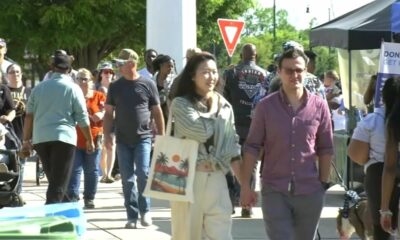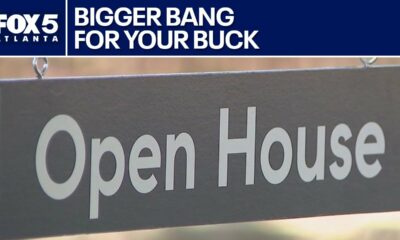News from the South - West Virginia News Feed
McDowell residents feel forgotten, overwhelmed as they face flood recovery with limited help
by Amelia Ferrell Knisely, West Virginia Watch
April 23, 2025
MCDOWELL COUNTY, West Virginia — When the flood water swept through McDowell County, West Virginia, in February, Ashley Rutherford sat in her wheelchair, unable to get out of her home as the water started coming through the doorway. One of her sons put rubber rain boots on her to cover her legs while the water came in.
Nine weeks later, the carpet in the home is still wet. The kitchen’s wooden floor is damp and buckling, and Rutherford’s wheelchair got stuck in a new hole in front of the sink. The downstairs rooms are full of her family’s stuff, crowding the path for her to get around.
“I’m overwhelmed,” said Rutherford, 33, a mother of four. “We’re living out of totes right now. My daughter can’t find the right outfit she wants to wear to school.”
Rutherford lives in Berwind, one of the poor county’s most southern towns. In its hollers, residents — many of whom are elderly — are waiting for help. They need federal aid. A stove. Volunteers to help them clear the thick mud from their basements.
There hasn’t been nearly enough help, and people feel forgotten by disaster relief agencies, nonprofit organizations and state government leaders in Charleston.
Many of McDowell’s residents are unable or unlikely to leave their long-time family homes, resulting in them now sitting in damp structures — some still without heat or running water — while mold starts to set in.
Dale Blevins, 70, stood in her damp basement, where patches of crystalized white mold were forming on the concrete walls. Volunteers cleaned out her basement after the flood; she didn’t know who would come in to remove the mold. Her husband relies on an oxygen tank, and the mold was likely already a danger for his health.
“I hate to ask for help,” she said, adding she hadn’t heard from any local or state officials. “Nobody has ever come here.”
The National Guard, church groups and other volunteers made their way through the county to help out. Those efforts have largely dried up. The local churches, many with elderly congregations, are limited in how they can help. Hundreds of homes still need to be cleared out and cleaned, residents say.
“We need the boots on the ground who are physically able to do the muck outs,” said Michael Brooks, a McDowell County commissioner. “It is hard work, it’s brutal work and very time consuming … I don’t know if some realize how dire the need is.”
Sydnei Tatum, 33, is a local business owner and photographer who took the images for this story. Over the last two months, she has cleaned out basements, handed out grocery gift cards and made lists of residents in need of everything from beds to refrigerators.
“I’m gonna fight for these people, because they have no one else to do it for them,” she said.
Tatum blamed the lack of recovery efforts on state leaders’ failure to prioritize McDowell County. They’d downplayed the crisis, she said.
“Purely because nobody is interested in the poorest areas of the county, and we are in it,” she said.
In February, Gov. Patrick Morrisey said the state “was in a position to act quickly,” while also requesting a federal disaster declaration to unlock resources for affected counties.
“We want to make sure we’re helping these southern counties recover,” Morrisey said at a press conference on Feb. 20 after visiting some parts of McDowell.
His spokesperson didn’t reply to questions for this story about the status of recovery efforts.
The flooding, which killed three people, happened during the legislative session; it wasn’t a major topic among lawmakers.
There isn’t dedicated funding in the recently-approved state budget for McDowell’s flood recovery.
Limited county funds, endless clean-up work
Carol Lester, 73, stood on her porch in Bartley, overlooking her washed out, sandy yard. She’d survived the flood, having to be rescued by two young men as water rushed into her kitchen and living room. She recalled how 911 couldn’t help her, then two men showed up and carried her husband, who is disabled, through the woods for five hours in the cold rain.
“We’ve been through five floods. This was the worst,” said Lester, who has been in her home for 51 years. “It seemed like you could hear the devil and his demons in that water.”
A destroyed sofa set was discarded in front of her house. It needed to be hauled away. She was waiting on a plywood delivery, hopeful that her family members could rip up her water-logged flooring.
No one other than Tatum had been by her house since the flood, Lester said.
Nobody cares, I’m telling you, this day and time.
– Carol Lester
Before the flood, McDowell was already facing hardships. It’s one of the poorest counties in the country, and some residents haven’t had clean drinking water for decades. Much of the county is located on a flood plain, and floods have swept through before. Fewer than 18,000 people now live in the county now that mining jobs have dried up.
The drop in population has impacted county finances reliant on local taxpayers, and Brooks explained that the bulk of money collected through personal property taxes goes to the board of education.
There isn’t enough left over, he said.
Thirty-six private bridges were washed out in the flood, some of which can’t be covered by Federal Emergency Management Assistance (FEMA) or county money. Some bridges may never be repaired.
“I wish to God that we had the funding that we could start fixing it. But, it’s not a few thousand dollar fix. It’s a hundreds of thousands dollar issue on some of the bridges,” Brooks said.
Brooks was frustrated over social media comments saying the county or state wasn’t doing enough. Morrisey had been helpful, he said, and required-government processes can be slow.
“I am bombarded, as well as the other commissioners, with more questions than answers at this juncture,” he said. “It’s not that we’re not trying to garner the answers or we’re trying to shrug these things off. But we’re a small county and a lot of times we don’t have resources.”
FEMA, which continues its efforts in the county, and Voluntary Organizations Active in Disaster (VOAD) didn’t return requests for comment for this story. Some residents said they weren’t expecting much help from the federal aid.
Debris-filled water poses a future flood risk
The floors are still damp in Linda Wood’s home in the community of Berwind.
“I’m going to need new flooring, like linoleum,” said Woods, 61. She lost her stove, lawnmower, clothes, shoes and more in the flooding.
“I’m worried about the moisture getting under the mattress and causing mold,” she added.
Rain is forecasted this weekend in McDowell, causing anxiety for Woods. She pointed to a nearby stream, filled with debris leftover from the flood. Without clearing it out, she said, another flood was likely to hit her community at any time.
The area’s stream beds haven’t been dredged or restored since the 1977 flood, WVVA reported. Rep. Shelley Moore Capito, R-W.Va., recently visited McDowell, promising to request money to clean up the streams in hopes of preventing future flooding.
Earlier this year, Morrisey didn’t request funding for the state’s flood mitigation efforts through the State Resiliency Office. The Republican-majority in the House of Delegates rejected a Democratic lawmakers’ proposal to put $50 million in the state budget to protect from future floods.
Politics and state funding aren’t the main topics of conversation among McDowell residents in April. Neighbors are wondering how they’ll clean out their basements and remove the mountains of debris scattered alongside roads. There aren’t large dumpsters in the area, and the county would need to work with the state to create a designated dumping site.
Lester looked at a holly bush in her yard that had survived the flood. Her husband bought it for her years ago.
“God left that holly bush for a reason. It weathered the storm, but it still survived,” she said. “Every morning, when I get up, I look at the little holly bush. I get my strength from that.”
YOU MAKE OUR WORK POSSIBLE.
West Virginia Watch is part of States Newsroom, a nonprofit news network supported by grants and a coalition of donors as a 501c(3) public charity. West Virginia Watch maintains editorial independence. Contact Editor Leann Ray for questions: info@westvirginiawatch.com.
The post McDowell residents feel forgotten, overwhelmed as they face flood recovery with limited help appeared first on westvirginiawatch.com
Note: The following A.I. based commentary is not part of the original article, reproduced above, but is offered in the hopes that it will promote greater media literacy and critical thinking, by making any potential bias more visible to the reader –Staff Editor.
Political Bias: Center-Left
The article primarily focuses on the severe struggles faced by the residents of McDowell County, West Virginia, in the aftermath of flooding, while also criticizing the lack of sufficient governmental response at both the state and federal levels. The piece highlights the failures of disaster relief agencies and the state government, particularly Governor Patrick Morrisey, and emphasizes the plight of the county’s poorest residents. The tone of the article expresses frustration with the political inaction and prioritization of more affluent areas. Additionally, the article touches on the lack of funds in state budgets for recovery efforts and criticizes the decision-making of a Republican-majority legislature, indicating a tendency toward a Center-Left perspective, where advocacy for governmental accountability and support for the marginalized is emphasized.
News from the South - West Virginia News Feed
Couple sentenced in historic human trafficking case intend to appeal convictions
SUMMARY: Jeannie White Feather and Donald Lance, sentenced to over 100 years for human trafficking and related charges, are set to appeal their convictions. During a recent court hearing, their defense attorneys indicated intentions to seek a higher court review due to possible legal errors. While the appeal process is underway, two minor misdemeanor charges for false swearing were dismissed since their sentences are already severe. The case, notable for being the first successful human trafficking prosecution in the state, originated from the discovery of their adopted children living in deplorable conditions.

Jeanne Whitefeather and Donald Lantz appeared virtually from prison in their first hearing since they were each sentenced to more than 100 years in prison, but as it was pointed out in court, the clock is ticking for them to appeal their case.
FULL STORY: https://wchstv.com/news/local/couple-sentenced-in-historic-human-trafficking-case-intend-to-appeal-convictions
_________________________________________
For the latest local and national news, visit our website: https://wchstv.com/
Sign up for our newsletter: https://wchstv.com/sign-up
Follow WCHS-TV on social media:
Facebook: https://www.facebook.com/eyewitnessnewscharleston/
Twitter: https://twitter.com/wchs8fox11
Instagram: https://www.instagram.com/wchs8fox11/
News from the South - West Virginia News Feed
Pope Francis and the legacy he leaves behind
SUMMARY: Pope Francis, the first Latin American pontiff, left a significant legacy, marked by his unorthodox approach to leadership and his focus on humility. He was known for his calls for peace, particularly in war-torn Gaza, where he forged a strong bond with local priests. Throughout his papacy, he emphasized simplicity, evident in his choice of a simple wooden coffin and unadorned burial tomb. Francis also took a strong stance on social justice, criticizing rising anti-Semitism and advocating for the release of Israeli hostages. His death has left a lasting impact on the Catholic Church and the global community.

VATICAN CITY (TNND) — The Vatican kept its doors open all night Wednesday due to the tens of thousands of mourners lined up to see Pope Francis lying in state inside St. Peter’s Basilica.
#Pope #PopeFrancis #Vatican #RIP #CatholicChurch #Faith #ChurchNews #PapalLegacy #Christianity #ReligiousNews #BreakingNews #PopePassesAway #GlobalReactions #InMemoriam #PapalHistory
_________________________________________
For the latest local and national news, visit our website: https://wchstv.com/
Sign up for our newsletter: https://wchstv.com/sign-up
Follow WCHS-TV on social media:
Facebook: https://www.facebook.com/eyewitnessnewscharleston/
Twitter: https://twitter.com/wchs8fox11
Instagram: https://www.instagram.com/wchs8fox11/
News from the South - West Virginia News Feed
Tech-related tariffs remain uncertain, but prepare for cost hikes, experts say
by Paige Gross, West Virginia Watch
April 25, 2025
The price of technology goods and services in the U.S. will likely rise in the next few months, experts say, as the White House continues to shift its strategy on tariffs for imported electronic hardware.
After initial reports that Chinese goods would receive as high as a 145% tariff, President Donald Trump said on April 13 that electronics like smartphones, computers and semiconductors — chips that process, power and transmit information — would be exempt. But Trump said later that day that imported semiconductors, and the electronics they’re embedded in, will likely be facing their own tariff structure in the coming weeks.
In tandem with Trump’s announcement, the U.S. Department of Commerce announced an official investigation into semiconductor imports, aiming to study the national security implications of importing manufacturing equipment and derivative products. The move is likely two-fold, tech experts say — Trump’s aim with foreign tariffs is to pressure American manufacturers to make more goods in U.S. facilities.
But his administration is also likely looking for cybersecurity risks that could be introduced through foreign manufacturing, like in compromised operating systems, embedded malicious code, or flawed designs, said Derek Lemke, senior vice president of product level intelligence at risk management firm Exiger.
“They power everything from advanced weapons systems and critical infrastructure to smartphones and laptops,” Lemke said. “Many of these components are manufactured abroad, often in regions with rising geopolitical tensions or limited transparency into supply chain practices.”
The U.S. is currently upping its manufacturing of semiconductors. It produced about 10% of the world’s semiconductors in 2022, and is projected to reach 14% by 2032 with the additional funding and infrastructure provided by the CHIPS and Science Act, passed during the Biden administration. But while many advanced chips are designed by American companies like Nvidia, Apple, Qualcomm and AMD, they are manufactured in Taiwan, which is currently negotiating tariff deals with the U.S.
Many electronics involve manufacturing processes from all over the world, making the tariff structure involved a complicated one. And while it’s a good idea for Americans to manufacture more of their semiconductors to diversify the global supply chain of chips, the country is nowhere near prepared to make as many as we need, said Nikolas Guggenberger, an assistant professor of law with a focus on antitrust, law and technology, privacy, and regulation at The University of Houston Law Center.
Guggenberger called semiconductor manufacturing “among the most complex industrial processes on Earth,” which would require years of planning, training and billions in investment for the U.S. to become a leader.
While the U.S. awaits more clarity over tariffs on electronic goods and the findings of the semiconductor probe, Guggenberger and Lemke say that American consumers should prepare themselves for higher prices on smartphones, laptops and other personal devices. Because semiconductors are used in so many everyday products, those price hikes could seep into wider spending, Guggenberger said.
“From a computer to everyday devices, like a garage opener, or a toaster,” he said. “It’s everything, it’s absolutely everything.”
Guggenberger said there’s a possibility that very high tariffs could also lead to a pause or slowdown in manufacturing in general, meaning consumers may see emptier shelves or a backlog on products in a few months.
Those on the software side of the tech industry will feel the effects, too, Lemke said. Software companies, AI developers and cybersecurity experts all rely on computing power from chip hardware, and disruption in the supply chain could slow innovation in these businesses, he said.
Even just the discussion of tariffs is having a ripple effect through the tech sector, Lemke said. Companies are having to evaluate their supply chains, their sourcing and maybe stockpile some components to their products.
“The uncertainty alone is enough to influence pricing, procurement strategies and investment decisions across the tech ecosystem,” Lemke said.
West Virginia Watch is part of States Newsroom, a nonprofit news network supported by grants and a coalition of donors as a 501c(3) public charity. West Virginia Watch maintains editorial independence. Contact Editor Leann Ray for questions: info@westvirginiawatch.com.
The post Tech-related tariffs remain uncertain, but prepare for cost hikes, experts say appeared first on westvirginiawatch.com
Note: The following A.I. based commentary is not part of the original article, reproduced above, but is offered in the hopes that it will promote greater media literacy and critical thinking, by making any potential bias more visible to the reader –Staff Editor.
Political Bias Rating: Center-Right
This article primarily focuses on the implications of the Trump administration’s tariff policies and the investigation into semiconductor imports. The content is not overtly political but highlights actions taken by the Trump administration, such as the investigation into semiconductor imports and the potential national security risks associated with foreign manufacturing. The article maintains a neutral tone but is likely to resonate more with a Center-Right audience due to its focus on economic nationalism, national security concerns, and a favorable portrayal of U.S. manufacturing efforts (particularly those tied to the CHIPS Act, passed under the Biden administration). There is some subtle tension in discussing the complexity and challenges of U.S. manufacturing capabilities, but the article doesn’t express a clear ideological stance, focusing instead on factual reporting. The use of experts to comment on the likely impacts of tariffs and supply chain disruptions keeps the tone relatively balanced, though the framing of tariffs as a pressure tactic on American manufacturers may lean towards a more conservative viewpoint on economic policy.
-

 SuperTalk FM6 days ago
SuperTalk FM6 days agoNew Amazon dock operations facility to bring 1,000 jobs to Marshall County
-

 News from the South - Missouri News Feed2 days ago
News from the South - Missouri News Feed2 days agoMissouri lawmakers on the cusp of legalizing housing discrimination
-

 News from the South - Alabama News Feed6 days ago
News from the South - Alabama News Feed6 days agoPrayer Vigil Held for Ronald Dumas Jr., Family Continues to Pray for His Return | April 21, 2025 | N
-

 News from the South - Florida News Feed6 days ago
News from the South - Florida News Feed6 days agoTrump touts manufacturing while undercutting state efforts to help factories
-

 Mississippi Today7 days ago
Mississippi Today7 days ago‘Trainwreck on the horizon’: The costly pains of Mississippi’s small water and sewer systems
-

 News from the South - Texas News Feed7 days ago
News from the South - Texas News Feed7 days agoMeteorologist Chita Craft is tracking a Severe Thunderstorm Warning that's in effect now
-

 News from the South - Virginia News Feed7 days ago
News from the South - Virginia News Feed7 days agoTaking video of military bases using drones could be outlawed | Virginia
-

 Mississippi Today4 days ago
Mississippi Today4 days agoStruggling water, sewer systems impose ‘astronomic’ rate hikes








































